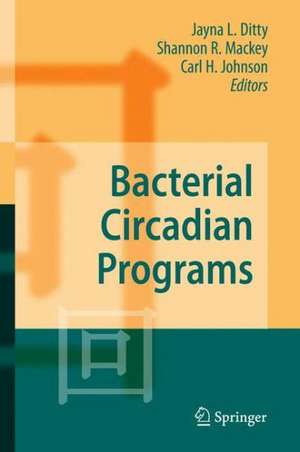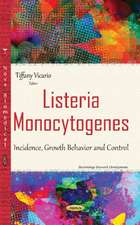Bacterial Circadian Programs
Editat de Jayna L. Ditty, Shannon R. Mackey, Carl H. Johnsonen Limba Engleză Paperback – 19 oct 2010
This book addresses multiple aspects of bacterial circadian programs: the history and background of the cyanobacteria and circadian rhythms in microorganisms, the molecular basis, structure, and evolution of the circadian clock, entrainment of the oscillator with the environment and the control of downstream processes by the clock, the demonstration of adaptive significance and the prokaryotic clock’s remarkable stability, and mathematical and synthetic oscillator models for clock function.
Experts in the field provide a timely and comprehensive review and a stepping-stone for future work on this amazing group of microorganisms and timing.
| Toate formatele și edițiile | Preț | Express |
|---|---|---|
| Paperback (1) | 946.87 lei 6-8 săpt. | |
| Springer Berlin, Heidelberg – 19 oct 2010 | 946.87 lei 6-8 săpt. | |
| Hardback (1) | 951.29 lei 6-8 săpt. | |
| Springer Berlin, Heidelberg – 10 feb 2009 | 951.29 lei 6-8 săpt. |
Preț: 946.87 lei
Preț vechi: 1154.72 lei
-18% Nou
Puncte Express: 1420
Preț estimativ în valută:
181.21€ • 188.48$ • 149.60£
181.21€ • 188.48$ • 149.60£
Carte tipărită la comandă
Livrare economică 14-28 aprilie
Preluare comenzi: 021 569.72.76
Specificații
ISBN-13: 9783642100086
ISBN-10: 3642100082
Pagini: 348
Ilustrații: XI, 333 p.
Dimensiuni: 155 x 235 x 18 mm
Greutate: 0.49 kg
Ediția:Softcover reprint of hardcover 1st ed. 2009
Editura: Springer Berlin, Heidelberg
Colecția Springer
Locul publicării:Berlin, Heidelberg, Germany
ISBN-10: 3642100082
Pagini: 348
Ilustrații: XI, 333 p.
Dimensiuni: 155 x 235 x 18 mm
Greutate: 0.49 kg
Ediția:Softcover reprint of hardcover 1st ed. 2009
Editura: Springer Berlin, Heidelberg
Colecția Springer
Locul publicării:Berlin, Heidelberg, Germany
Public țintă
ResearchCuprins
Classic Circadian Characteristics: Historical Perspective and Properties Relative to the Synechococcus elongatus PCC 7942 Model.- Speculation and Hoopla: Is Diversity Expected in Cyanobacterial Circadian Timing Systems?.- Circadian Rhythm of Cyanothece RF-1(Synechococcus RF-1).- The Decade of Discovery: How Synechococcus elongatus Became a Model Circadian System 1990–2000.- The Kai Oscillator.- NMR Studies of a Timekeeping System.- Structural Aspects of the Cyanobacterial KaiABC Circadian Clock.- Mechanisms for Entraining the Cyanobacterial Circadian Clock System with the Environment.- Factors Involved in Transcriptional Output from the Kai-Protein-Based Circadian Oscillator.- Chromosome Compaction: Output and Phase.- Cell Division Cycles and Circadian Rhythms.- The Adaptive Value of the Circadian Clock System in Cyanobacteria.- Stability and Noise in the Cyanobacterial Circadian Clock.- The Circadian Clock Gear in Cyanobacteria: Assembled by Evolution.- Circadian Clocks of Synechocystis sp. Strain PCC 6803, Thermosynechococcus elongatus, Prochlorococcus spp., Trichodesmium spp. and Other Species.- Mathematical Modeling of the In Vitro Cyanobacterial Circadian Oscillator.- A Synthetic Biology Approach to Understanding Biological Oscillations: Developing a Genetic Oscillator for Escherichia coli.
Caracteristici
A timely review of the fundamental process of circadian timing in prokaryotes written by experts in the field Includes supplementary material: sn.pub/extras








